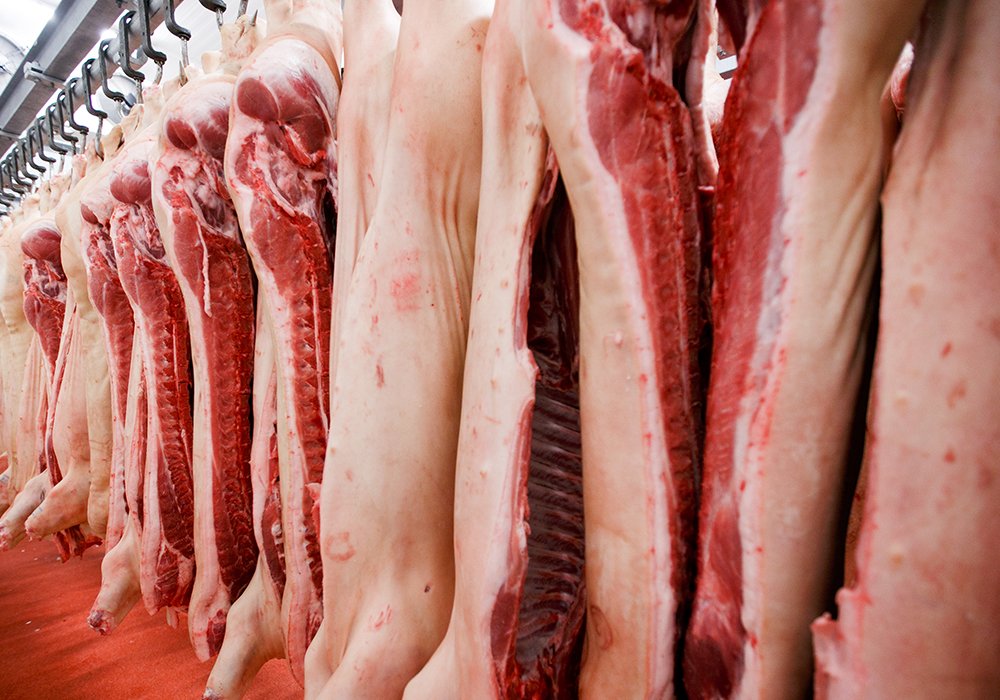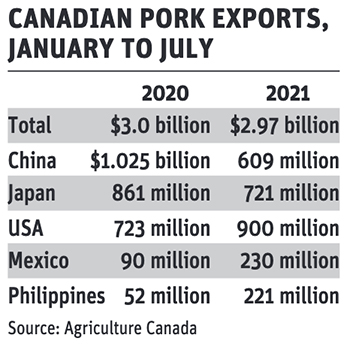Alternative pork export markets soar as Chinese sales fall

Philippines, Mexico help offset large drop in shipments to China caused by COVID concerns and softer domestic demand
Canada’s pork exports to China were $609 million in the first seven months of 2021.
That sounds decent, but sales to China were $1.025 billion at the end of July in 2020, which means Canadian pork exports to China are down $400 million this year.
In a normal year, a $400 million drop in exports would be massive news. But Canadian exporters have found alternative markets for Canadian pork, mostly Mexico and the Philippines.
Exports to those countries have exploded, increasing 155 and 327 percent, respectively:
- Pork sales to the Philippines were $221 million to the end of July, up from $52 million for the same period in 2020.
- To Mexico, sales were $227 million, a jump from $90 million in 2020.
The strong sales to Mexico and the Philippines are connected to the drop in exports to China.
“The (Chinese) market was very strong last year, but a combination of Canadian pork plant suspensions (due to COVID) and a softening Chinese domestic market has led to lower China purchases from Canada this year,” Trevor Sears, president and chief executive officer of Canada Pork, a market development and promotion organization for the country’s pork industry, said in an email. “This has left more Canadian pork available to other markets. Markets like Mexico and the Philippines are taking advantage of this.”
China has suspended pork imports from a number of Canadian processing plants because of concerns related to COVID. Some of the suspensions happened in 2020, when employees at the plants tested positive for COVID. The packers expected China to lift the bans in weeks or months, but that hasn’t happened.
“All suspended plants presented (a) reinstatement package, with no response from China,” the Canadian Meat Council said in an email.
The Chinese ban on certain packers represents 65 percent of all the pork processing capacity in Canada. The lack of response may be connected to Chinese claims that the coronavirus can survive on imported foods, like frozen meat.
China has been testing and scrutinizing food imports for traces of the coronavirus, even though experts say the average person is more likely to win the lottery than get COVID from food.
“It’s so rare as to be of negligible importance in the real world,” Emanuel Goldman, a microbiologist at Rutgers University, told NPR in the U.S. “It’s very unlikely that you would get the virus from food… (it) is a virus you get by breathing.”
Regardless of the science, Canadian exporters are shipping less pork to China and more to the Philippines, where African swine fever has slashed hog numbers and pork production.
In 2019, the Philippines produced about 1.5 million tonnes of pork. The U.S. Department of Agriculture estimates that figure will drop to one million tonnes this year, which has forced the Philippines to increase imports.

In the first four months of 2021, imports were up 401 percent as the Philippines brought in more pork from Canada, the European Union, the U.S. and Brazil.
Canada’s booming exports to the nation may not last because the Philippines is planning to recover from ASF and boost domestic pork production.
“We expect (it) will continue to be a strong market for Canada in the long term, but the volumes will moderate as they get ASF under better control in the coming years,” Sears said.
Mexico has consistently been a significant market for Canadian pork, but China is the major opportunity for all meat-exporting countries.
Looking ahead, Canada needs improved relations with China to sort out trade disruptions, such as “temporary” suspensions of pork processing plants.
The meat council is asking the next government to appoint a special envoy to China to gain more market access for Canada’s meat exporters.
“We are competing with so many countries for visibility and access and there is a lot of expectations to put on the embassy to think they can solve all our issues while also dealing with other sectors,” the council said. “Everything is predicated on relationships in China. This person would help establish relationships and guide the industry and the staff at the embassy.”
Source: www.producer.com

